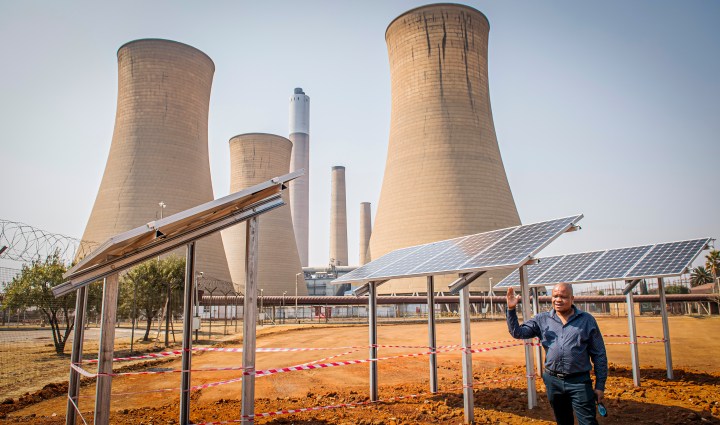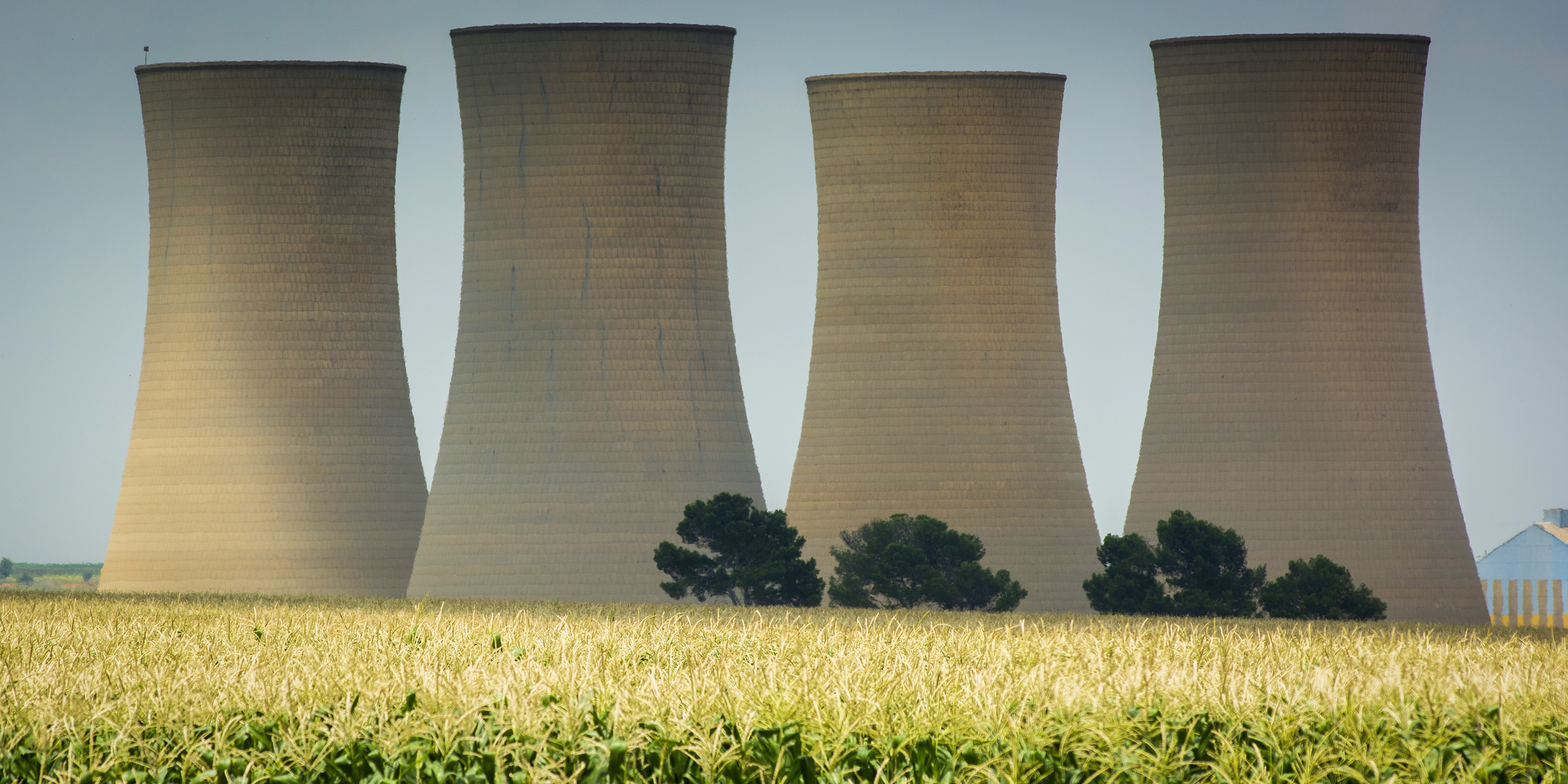ELECTRICITY CRISIS
Komati Power Station — the cautionary tale of the Just Energy Transition and lessons to be learnt

Members of the Presidential Climate Commission have repeatedly pointed out that the many mistakes in the project to decommission the Komati Power Station should never have been made. These are some of the impacts of the project and lessons to be learnt.
‘They started to engage us after they shut the power plant down; that’s when they came into the community. Before that, we never had a proper conversation with them. Everything moves without us knowing. We hear things from journalists, and then after that they tell us politicians are coming, etc. But the community is left in the dark. Even myself, I don’t properly understand the just transition,” said Carlos Vilankulu, a community leader in Komati.
Only two years after the Komati Power Station in Mpumalanga was decommissioned did Eskom begin community consultations, Vilankulu told Daily Maverick. He was subcontracted as a welder at the power utility before being laid off in 2018. The community leader said he was hearing in the news about what was happening regarding the Just Energy Transition (JET) and that he and his community had been left in the dark. He says they continue to be left in the dark about the intricate details of the transition.
Read more in Daily Maverick: Past mistakes might hold the answer to South Africa’s successful transition to renewable energy
Members of the Presidential Climate Commission (PCC) have repeatedly pointed out that there were many mistakes made in decommissioning the power station that should never have been made. At a workshop run by the commission recently, on mobilising finance for the JET, some commissioners and stakeholders said the transition was complex and that additional support was needed, and emphasised the impact on municipalities and the concerns about the extent of involvement of the relevant community members.
The remarks aligned strongly with the commission’s report on “Early Lessons and Recommendations from Komati’s Decommissioning and Repurposing Project”, released at the end of 2023. It found that informing the communities had been delayed, with no economic diversification efforts after the decommissioning, that there was a lack of meaningful consultation with the community, as well as a delayed process, and that an intersectional approach was necessary, alongside significant financial support.
“The engagements around the decommissioning process at Komati fell short of the inclusive and participatory engagements required to embody procedural justice. For future decommissioning projects, the PCC intends to work with Eskom, local government and other relevant actors on a public engagement strategy, to help build consensus and support on difficult transitional issues,” the report reads.
Komati’s last operation unit was shut down in October 2022. At the time the unit was only producing 121MW of power. Just a month before, Eskom had partnered with the South African Renewable Energy Technology Centre and the Global Energy Alliance for People and Planet for a training facility for renewable energy at the old power station.
Eskom told Daily Maverick that, to date, the utility had concluded an agrivoltaic facility to be used for community training and as an incubator for new businesses focused on agricultural activities; the facility was also hosting aquaponics and mushroom farming. The agrivoltaic facility was the only one producing energy of 500kWp at Komati.
“We have recently completed the establishment of a factory to fabricate and assemble containerised microgrids. This facility will employ 30 people. In addition, we have in partnership with the Industrial Development Corporation, created employment for 200 youth from Komati to remove alien vegetation from the region for further beneficiation.
“There are many other initiatives in the advanced stages of development, including the 100MW PV plant with a 600MWh battery energy storage system where we will engage the market on a commercial basis within the next few months for the construction of this facility. We recently received environmental approval for this,” said Eskom.

The cooling towers at the Komati Power Station in Mpumalanga on 12 January 2021. (Photo: Waldo Swiegers / Bloomberg via Getty Images)
But for Vilankulu, all of these efforts are insignificant because many in his community remain unemployed. He wonders what aquaponics – the fish which he says died on the first day – and mushrooms have to do with power generation when those skilled in generation are impoverished and unemployed. According to Eskom, about 360 contractors lost their jobs and 185 remain on the books. Komati currently employs 162 at the facility, with other employees having been placed at other power stations – compared with a peak of almost 400 employees.
“In a family of six or seven, you’ll find that none of them are working, but there are kids that must go to school. Where is the subsidy for that family, or for the kids? Even saying that the school and learners should be helped because they know most of the families are not working. Instead they’ll tell you Eskom doesn’t have money. Maybe things are like this because most of the decision-makers are not from around here, so they don’t understand what is happening. That is why they are still working; those who are full cannot determine when the hungry eat!” Vilankulu said.
South Africa has been hailed as a darling on the global stage, with investors eager to back the country, and the rest of the world – particularly developing countries – watching closely to blueprint the plan in their own countries. This is thanks to a stellar JET Investment Plan with a Just Transition Framework policy that incorporates an inclusive multi-stakeholder consultation process. These efforts created a “watershed” moment for the country by securing funding for the plan in 2021.
Read more in Daily Maverick: What happened to the Just Energy Transition grant funding?
A year later, the World Bank approved a $497-million project to support the decommissioning of Komati. This aspect cost $33.5-million, while repurposing the plant to house renewables and batteries was calculated to cost $416-million. The third component of the project – minimising the socioeconomic impacts of the plant’s closure by introducing work opportunities for the communities – was estimated at $47.5-million, the PCC report said. The decommissioning was independent of the JET IP and funding allocated to that.
However, the Komati project provides strong lessons as the country moves forward with its just transition.
Read more in Daily Maverick: New investment pledges boost South Africa’s just energy transition funding pool to $11.8bn
Eskom acknowledged its shortcomings in its responses, noting “a lesson learnt, albeit a harsh lesson”. The utility added that it would welcome a portion of the JET IP financing from the International Partners Group’s $11.8-billion (France, Germany, UK, US, European Union, Denmark, Netherlands and Spain) being allocated to expansion of its transmission network, transition to cleaner fuel sources and addressing the social imbalances of the transition.
Read more in Daily Maverick: Government’s debt relief for Eskom gives power utility some breathing space
For Vilankulu, the socioeconomic imbalances are painful and have left him wondering if those at the utility fully understand what they are doing – a concern given the exodus of experts over the past couple of years.
Local municipalities have similar concerns as they worry about Komati and other areas becoming ghost towns and what already strained services will be left in the future. The PCC report paints a picture of how some of these can be avoided through early engagement, immediate training, transparency and inclusivity, and with local governments playing their part – with the support of the national government – in diversifying their economies.
These would be crucial recommendations to consider amid the delayed decommissioning of the Camden, Grootvlei, Hendrina, Kriel, Arnot and Tutuka plants.
Read more in Daily Maverick: SA’s energy and climate brain drain: Will the last person to leave please switch off the lights
“I would say that it was better when Mandela was in Robben Island breaking stones than what they are doing now in this era,” said the community leader. “At the back of my head, I have it that they are waiting for someone to make the call to go back to coal because this thing won’t work. That’s how I see it. But we are waiting.” DM



















 Become an Insider
Become an Insider
Feel good phrases like ‘just energy transition’ coming out of the mouths of politicians, especially the ANC variety, are indicators of lots of tax money about to be spent wastefully. The notion that the people who have driven ESKOM into the ground will be any better at the relatively more complex job of replacing coal generation with cuddlier alternatives is beyond naïve.
They aren’t the only ones, it’s happening all over the country. This useless anc governmunt does what ever suits their bbeee cadre tenderpreneurs and the kickback that they get, should all be in prison
Mr Vilankulu was left wondering if the people at Eskom knew what they were doing. Please, Mr Vilankulu, be assured and wonder no longer, you are correct.